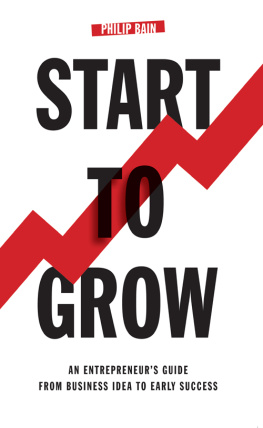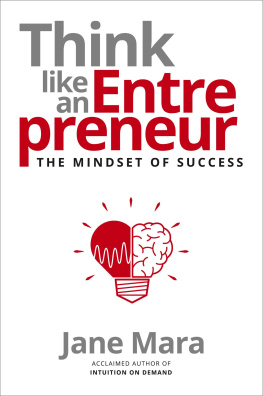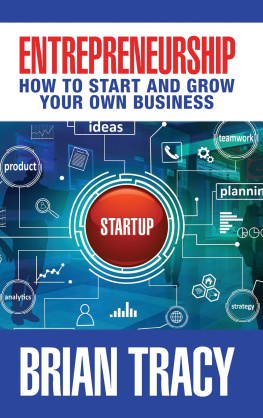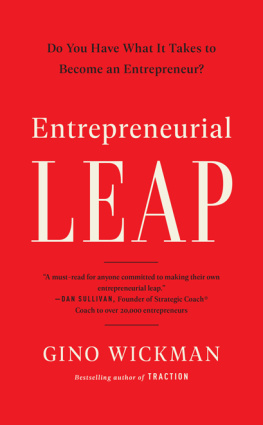FROM IDEA TO SUCCESS
FROM IDEA TO SUCCESS
The Dartmouth Entrepreneurial Networks GUIDE FOR START-UPS
GREGG E. FAIRBROTHERS
TESSA M. WINTER


Copyright 2011 by Gregg E. Fairbrothers and Tessa M. Winter. All rights reserved. Except as permitted under the United States Copyright Act of 1976, no part of this publication may be reproduced or distributed in any form or by any means, or stored in a database or retrieval system, without the prior written permission of the publisher.
ISBN: 978-0-07-176345-5
MHID: 0-07-176345-7
The material in this eBook also appears in the print version of this title: ISBN: 978-0-07-176079-9, MHID: 0-07-176079-2.
All trademarks are trademarks of their respective owners. Rather than put a trademark symbol after every occurrence of a trademarked name, we use names in an editorial fashion only, and to the benefit of the trademark owner, with no intention of infringement of the trademark. Where such designations appear in this book, they have been printed with initial caps.
McGraw-Hill eBooks are available at special quantity discounts to use as premiums and sales promotions, or for use in corporate training programs. To contact a representative please e-mail us at bulksales@mcgraw-hill.com.
This publication is designed to provide accurate and authoritative information in regard to the subject matter covered. It is sold with the understanding that neither the author nor the publisher is engaged in rendering legal, accounting, securities trading, or other professional services. If legal advice or other expert assistance is required, the services of a competent professional person should be sought.
From a Declaration of Principles Jointly Adopted by a Committee of the American Bar Association and a Committee of Publishers and Associations
TERMS OF USE
This is a copyrighted work and The McGraw-Hill Companies, Inc. (McGraw-Hill) and its licensors reserve all rights in and to the work. Use of this work is subject to these terms. Except as permitted under the Copyright Act of 1976 and the right to store and retrieve one copy of the work, you may not decompile, disassemble, reverse engineer, reproduce, modify, create derivative works based upon, transmit, distribute, disseminate, sell, publish or sublicense the work or any part of it without McGraw-Hills prior consent. You may use the work for your own noncommercial and personal use; any other use of the work is strictly prohibited. Your right to use the work may be terminated if you fail to comply with these terms.
THE WORK IS PROVIDED AS IS. McGRAW-HILL AND ITS LICENSORS MAKE NO GUARANTEES OR WARRANTIES AS TO THE ACCURACY, ADEQUACY OR COMPLETENESS OF OR RESULTS TO BE OBTAINED FROM USING THE WORK, INCLUDING ANY INFORMATION THAT CAN BE ACCESSED THROUGH THE WORK VIA HYPERLINK OR OTHERWISE, AND EXPRESSLY DISCLAIM ANY WARRANTY, EXPRESS OR IMPLIED, INCLUDING BUT NOT LIMITED TO IMPLIED WARRANTIES OF MERCHANTABILITY OR FITNESS FOR A PARTICULAR PURPOSE. McGraw-Hill and its licensors do not warrant or guarantee that the functions contained in the work will meet your requirements or that its operation will be uninterrupted or error free. Neither McGraw-Hill nor its licensors shall be liable to you or anyone else for any inaccuracy, error or omission, regardless of cause, in the work or for any damages resulting therefrom. McGraw-Hill has no responsibility for the content of any information accessed through the work. Under no circumstances shall McGraw-Hill and/or its licensors be liable for any indirect, incidental, special, punitive, consequential or similar damages that result from the use of or inability to use the work, even if any of them has been advised of the possibility of such damages. This limitation of liability shall apply to any claim or cause whatsoever whether such claim or cause arises in contract, tort or otherwise.
Contents
Introduction
The Entrepreneur Will Save Us?
Vision is the art of seeing things invisible.
Jonathan Swift
Imagine a truly prosperous economyprosperous because innovation thrives. Growth is sustainable and creates jobs for everyone who wants one: rewarding, fulfilling jobs for people all across the demographic spectrum. And that prosperity is widely shared. Imagine that opportunity is open to all people to make what they can of themselves. They can do well for themselves by creating value for everyone. People renew themselves over and over, all through their lifetimes. They do well and do good. Imagine that labor doesnt have to compete for jobs across borders, driving wages into the ground; it complements the innovation and creativity of new ventures, leveraging the amazing human capacity for creativity and building new things. It sounds so appealing. Would that we could see this today wherever we are. Sad to say, this is not exactly what we see. But that doesnt mean it isnt there.
Almost by definition, entrepreneurial value creation comes from someone being entrepreneurial. In good times, value creation adds fire to a thriving economy. In bad times, entrepreneurial value creation rekindles dimly glowing coals. Lately it seems there are more bad times than good. We see an economy with deep-rooted problems; no one is denying that. The economy has always had problems of one kind or another, yet everyone from average college grads looking for their first jobs to economists studying national economic trends seems more worried than ever, and they are all worried for one main reason: People cannot find the kind of work they want and need, at least not where theyve always looked for it before. We need to create more good jobs.
There are really only three ways to create jobs: You can grow the companies you have, steal companies from somewhere else, or create new ones. As to growing and stealing, in the last three decades the developed world has been losing ground. Our existing firms are not growing much. According to the Bureau of Labor Statistics, from 2000 to 2009 the economy added essentially no new jobs. We will never turn back the economic clock and recapture those lost jobs. All we can do is create new ones. This means that if we are going to create new jobs, we are going to have to rely on growth through innovation, creating new companies and growing the ones we have with new ideas and new products.
Hence the new hope: The entrepreneur will save us. In a recent study by the Kauffman Foundation, Dane Stangler described the need for a new discussionone that not only promotes entrepreneurship, but specifically high-growth entrepreneurship... because top-performing companies are the most fruitful source of new jobs and offer the economys best hope for recovery.
Governments are also pushing entrepreneurship. They are even putting money behind it. Kathy Barks Hoffman of the Associated Press reported in February 2010, Gov. Jennifer Granholm is counting on entrepreneurs to bring Michigans struggling economy back from the brink. So much so that she plans to set aside $200,000 to teach budding entrepreneurs and help provide $43 million for small business loans. Carl Schramm and Robert E. Litan wrote in the Wilson Quarterly in 2010:
[President Obama] embraced entrepreneurs near the beginning of his 2010 State of the Union address and has since outlined a series of steps to encourage small business to create new jobs: $33 billion in tax credits for hiring new workers and $30 billion in low-interest loans (from the Troubled Asset Relief Program) intended to spur community banks to lend to small business.










